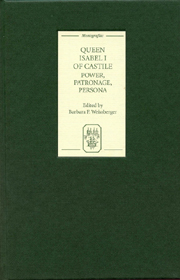Book contents
- Frontmatter
- Contents
- List of Contributors
- Acknowledgments
- Introduction: “Questioning the Queen, Now and Then”
- PART 1 INFLUENCE: ARAGON, PORTUGAL, AND NORTHERN EUROPE
- Part 2 Patronage: Reciprocal Relationships
- Part 3 Period: From Medieval to Modern
- “The Artistic Patronage of Isabel the Catholic: Medieval or Modern?”
- “Conflictive Subjectivity and the Politics of Truth and Justice in Cárcel de Amor”
- “Juan de Anchieta and the Rest of the World”
- “Inventing the Catholic Queen: Images of Isabel I in History and Fiction”
- Works Cited
- Index
“Conflictive Subjectivity and the Politics of Truth and Justice in Cárcel de Amor”
from Part 3 - Period: From Medieval to Modern
Published online by Cambridge University Press: 12 September 2012
- Frontmatter
- Contents
- List of Contributors
- Acknowledgments
- Introduction: “Questioning the Queen, Now and Then”
- PART 1 INFLUENCE: ARAGON, PORTUGAL, AND NORTHERN EUROPE
- Part 2 Patronage: Reciprocal Relationships
- Part 3 Period: From Medieval to Modern
- “The Artistic Patronage of Isabel the Catholic: Medieval or Modern?”
- “Conflictive Subjectivity and the Politics of Truth and Justice in Cárcel de Amor”
- “Juan de Anchieta and the Rest of the World”
- “Inventing the Catholic Queen: Images of Isabel I in History and Fiction”
- Works Cited
- Index
Summary
With few exceptions (see Márquez Villanueva 1966, 1976; Weissberger 1992; and Rohland de langbehn 1989), most approaches to Diego de San Pedro's Cárcel de Amor have dwelled on the work's formal or generic aspects, its place in the emotive universe of courtly love and sentimental fiction, or questions regarding the identity and the possible religious affiliations of its author (see chiefly Whinnom 1974; and Rohland de langbehn 1989), often separating the work from the identifiable historical human context in which it was conceived. Yet Cárcel de Amor's explicit portrayal of the enactment of justice at court, plus its mention of important historical events and contemporary historically-important place names from the closing years of the fifteenth century – the war against Granada, Sierra Morena, and the dominion of Peñafiel – as well as its dedication to Diego Fernández de Córdoba, alcaide de los donceles, husband of Doña Juana Pacheco, a kinswoman of the influential Téllez-Girón family of the lords of Peñafiel, requires that close attention be paid to the work's social and political ramifications.
The numerous references to contemporary personages and events in Cárcel signal both its author's and the work's links to an immediate historical moment and its propinquity to one of the most powerful nobiliary clans of late fifteenth-century Castile, the Girones, bitter enemies of Fernando and Isabel.
- Type
- Chapter
- Information
- Queen Isabel I of CastilePower, Patronage, Persona, pp. 149 - 168Publisher: Boydell & BrewerPrint publication year: 2008



